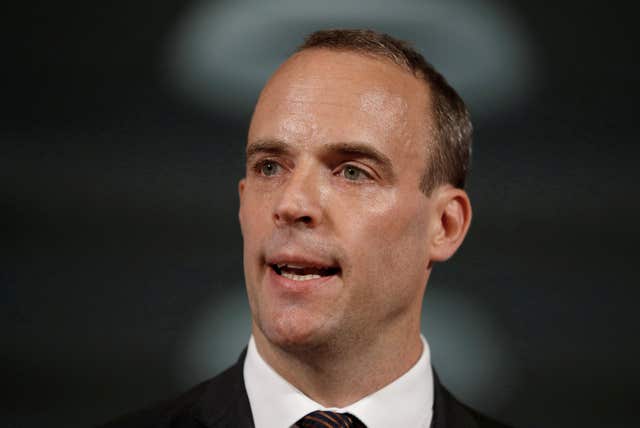
Mobile phone bills for customers living near the border in Northern Ireland could spike after Brexit, the Government has warned.
Papers setting out what could happen if no deal is struck warn how consumers and businesses should be aware of “inadvertent” data roaming – where a stronger signal from the Republic kicks in.
It comes after Brexit Secretary Dominic Raab urged phone companies not to impose roaming charges on customers if Britain crashes out of the European Union.

Which? chief executive Peter Vicary-Smith said: “Two-thirds of people think it is important that free roaming exists when travelling in the EU, so the news that we could face the return of sky-high charges to use our phones abroad will come as a real blow.
“If the Government is to deliver a Brexit that works for consumers, it needs to not only maintain free roaming across the EU, but also look to extend the benefit of free roaming for people visiting countries worldwide.”
Vodafone, Three, EE and O2, which cover more than 85% of mobile subscribers, have said they have no current plans to change their approach to mobile roaming once the UK leaves.
The Government will legislate to introduce a cap on charges if there is a no-deal scenario.
It would set a £45 per monthly billing period limit and force companies to send alerts when 80% of that had been reached.
Mr Raab told BBC Radio 4’s Today programme: “We’ve had some good news from businesses like Vodafone and Three. They have publicly said they wouldn’t introduce any roaming fees for UK consumers travelling on the continent.
“What we have said is we would like to see other companies following suit, but, in any event, we would legislate for a limit on roaming charges to make sure in a no-deal scenario that we protect British consumers.”
The Government advice says if the UK leaves without a deal, customers should check their operator’s roaming policies, consider switching provider, know how to turn off roaming services and look at using wi-fi for making calls.
If a deal is secured, surcharge-free roaming will continue during the transition period but arrangements after that are dependent on the outcome of the negotiations on the Future Economic Partnership.
An O2 spokeswoman said: “We’re committed to providing our customers with great connectivity and value when they travel overseas. We currently have no plans to change our roaming services across Europe.
“We will be working closely with the Government and other European operators to try and protect the current arrangements so our customers can continue to enjoy free EU roaming once Britain officially leaves the EU.”
An EE spokesman said: “EE customers enjoy great value products and controls offering inclusive roaming in Europe and beyond, and we don’t have any plans to change these offers.
“We are working closely with government on this and hope they will put consumers at the top of their agenda in the Brexit negotiations to help ensure that UK operators can continue to offer low prices to our customers.”


Comments: Our rules
We want our comments to be a lively and valuable part of our community - a place where readers can debate and engage with the most important local issues. The ability to comment on our stories is a privilege, not a right, however, and that privilege may be withdrawn if it is abused or misused.
Please report any comments that break our rules.
Read the rules hereLast Updated:
Report this comment Cancel